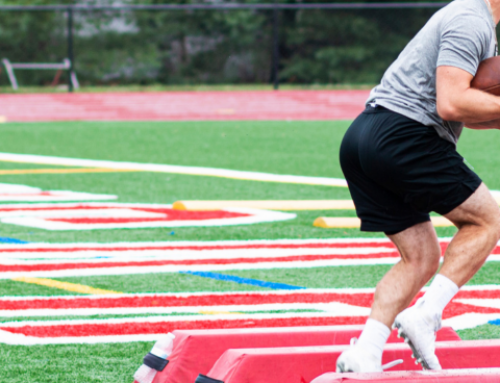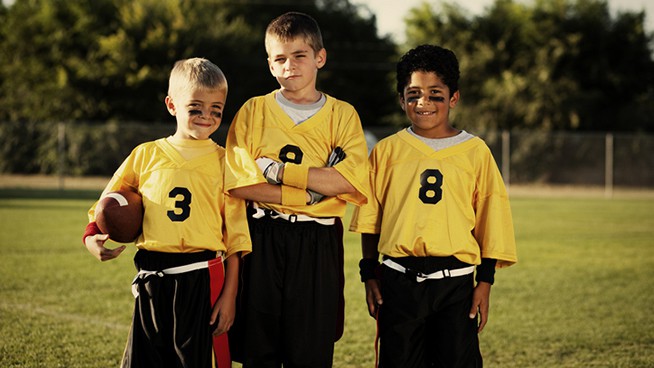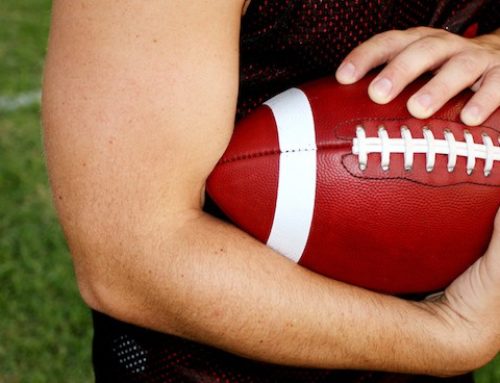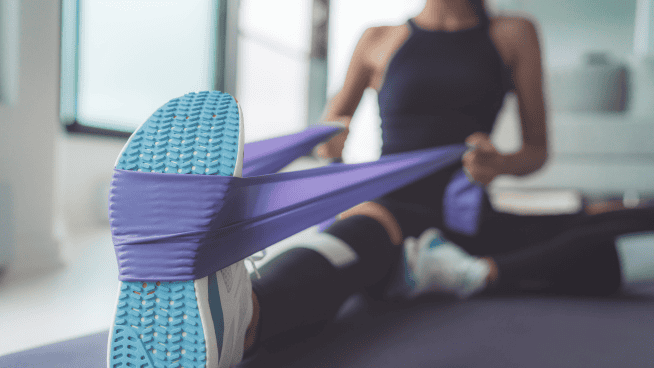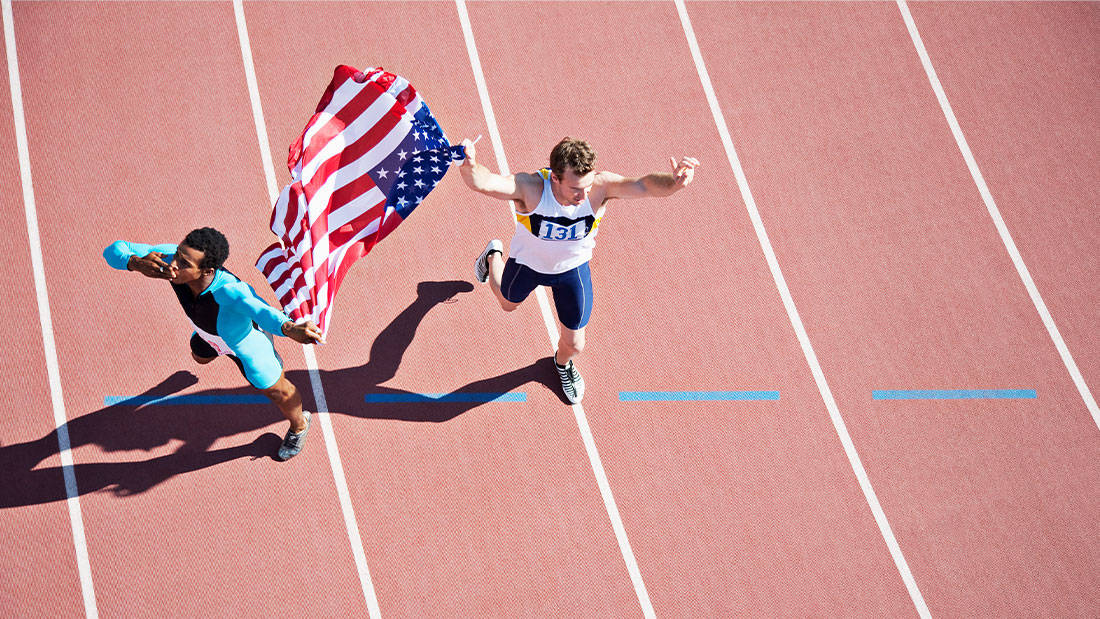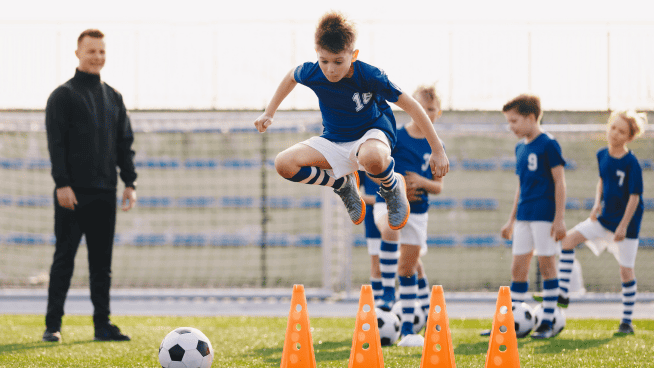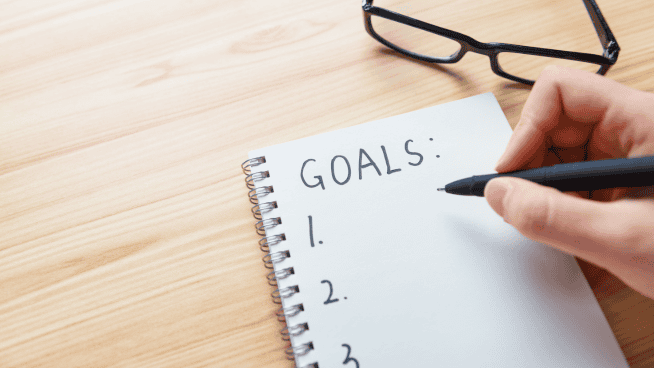Philadelphia Eagles Could Have a Raw Diamond in the Rough with Offensive Tackle Prince Tega Wanogho
Prince Tega Wanogho was called “Prince” because his grandfather was the king of his village of Warri, in Delta State, Nigeria. Young Prince grew up playing soccer, but it was basketball that stole his heart. He wanted to be a basketball star; specifically, the next Lebron James. He was 6-5, the seventh of nine children in his family, and he looked at basketball as his path to a better life.
When Todd Taylor, a high school basketball coach at Edgewood Academy in Elmore, Alabama, north of Montgomery, saw videos of Tega Wanogho at a basketball camp in Nigeria, Taylor quickly offered Tega Wanogho a scholarship to come to the United States. He would live with Taylor, whom he called “Papa T,” and his wife Christy, whom he called “Mama T,” throughout his high school career. But he would quickly realize basketball wasn’t the only game in town.
Edgewood’s football coach saw Tega Wanogho and another basketball player tossing a football on the sidelines at basketball practice, and asked if he wanted to try out for the team. Tega Wanogho’s only football knowledge came from the movies The Longest Yard, The Waterboy and Remember the Titans, but he decided to give it a shot. The school had no cleats to fit his size-16 feet, so he laced up his Jordans, put on a helmet and stepped on the field for his tryout as a defensive tackle.
“On defense, the game plan was just to get the quarterback,” Tega Wanogho says. “For a long time, I couldn’t differentiate the running back and the quarterback, so I’d just tackle whoever got the ball.”
Tega Wanogho learned quickly, and by his junior year in high school, he was being heavily recruited by college football powerhouses Georgia, Florida, Oregon and Kentucky. But he decided on nearby Auburn, where he was moved from defense to offense. By 2017, just a few short years after taking up football, he was starting for the Tigers at left tackle. He started 25 of 26 games as a junior and senior and earned second-team all-SEC honors in 2019. And, he fulfilled the promise he made to his mother, who passed unexpectedly in 2017, so many years ago in Nigeria. He graduated with not one, but two degrees; the first in interdisciplinary studies with a minor in sport coaching, and the second in human development and family studies.
Tega Wanogho missed the NFL combine with a meniscus tear in his right knee, an injury through which the 305-pounder played most of his senior year at Auburn. He was initially projected to go in the third round of April’s NFL draft, but his injury likely caused his stock to fall and allowed the Eagles to get him as a late-round steal, at No. 210 overall in the 6th round. Other teams may have been worried about Tega Wanogho’s general lack of football experience, but Auburn head coach Gus Malzahn disagrees.
“His best days are ahead of him,” says Malzahn of Tega Wanogho, who has the feet of a soccer player and the massive body of an All-Pro tackle. “You are talking about a guy who has only played the position for two and a half years. I think the sky is the limit for him and he may end up being the steal of the draft when everything is all said and done and you can fast forward a few years.”
Tega Wanogho, who faced some of the most talented pass rushers in the country while at Auburn, is confident in his own abilities as well.
“I didn’t give up a sack last year,” Tega Wanogho told NJ.com. “And I feel like that’s something most of the coaches worry about, thinking about I’m a newcomer; but at the same time, I’m a guy who takes pride in whatever I do. I stay hungry at all times, and I’m going to come in there ready to go to work.”
STACK sat down with Tega Wanogho, who was training at EXOS in Pensacola, Florida, to prepare for the NFL combine. Here is a transcript of that interview, which has been edited for brevity and clarity.
Tega Wanogho Interview Transcript
STACK: Tell us a little bit about where you originally grew up.
PRINCE TEGA WANOGHO: I originally grew up in Delta State, Nigeria. I moved to the United States when I was 16, in August, 2014. The dream originally was to come here and play basketball, with the hope of being the next LeBron James. It turns out I was actually better at football. I was out there watching kids practice football at my high school, Edgewood Academy in Alabama. The coach asked me if I wanted to play. I had seen movies about football, The Longest Yard and Waterboy, but aside from that, I didn’t know much about it. But I said OK. I remember going to the tryouts and they didn’t have size 16 cleats for me, so I had to practice in my tennis shoes, and they helped me put the pads on and gave me a helmet. It felt so different.
For Americans that might not be familiar with the Delta State region, what is it like?
It’s not as developed as the United States. Delta State has a total of 40-something million people. Warri is the city I grew up in, and it’s the biggest city in Delta State. The capital is Asaba. Everything is way different, especially talking about construction or building-wise or road-wise. It’s not as developed. You still have people selling food on the roadside. Coming to the United States is a big eye-opener because you see movies of the United States and you always say to yourself, “I want to be able to to go there someday. I want to be able to see stuff like that some day.” So, it’s crazy to be here.
What other sports did you play growing up?
Growing up, Soccer was our football. That’s what we play. I always wanted to play the striker position, but they always asked me to go to the back because I was taller than my age group and I always played center back playing soccer. I played soccer until I was 13 or 14, when I started seeing myself as taller than every other kid. I was invited to a basketball academy in Nigeria, and I fell in love with it. I was a power forward and a center, but I always actually wanted to play the point guard because I thought I had the best hands on the court. I always wanted to bring the ball up court, but I wasn’t a very good shooter. I was pretty good in mid-range and at the rebounding game, and I was good at dunking the ball.
How’d you feel about going to America to try and play basketball?
It was something I always dreamt about. I always thought I was going to be the next LeBron James. It was a big change, leaving my family and coming to the United States. I was the only one who came over. My family was still back home in Nigeria. It was tough, but at the same time my family understood this was actually a big chance for me to become something in life, and realized I was actually doing something not for just myself, but also for my family back home. They knew it was the right decision to make.
How was the adjustment of living with an American family in America?
I lived with the Taylor family. At first, I wasn’t comfortable, and they weren’t really comfortable, but Mama C – I called Christy Taylor Mama C and Todd Taylor Papa T – tried so hard to make sure she pleased me and to provide for me, because she told my mom she was going to take care of me. But living with a new family in a new land was an adjustment. I felt like an invader in their home. But now, they’re my family.
What position did you play when you started football?
They had put me on defense and I remember they were trying to teach me how to get in the three-point stance, which was hard. They actually put me on tight end on offense also. The coach told me if they actually were going to pass the ball to me, just run straight 10 yards. I didn’t even know what 10 yards was on the football field. So, I was just running, and they’d tell me to go left or right. On defense, the game plan was just to get the quarterback. For a long time, I couldn’t differentiate the running back and the quarterback. So, all I’d just tackle whoever got the ball. That’s how the whole football thing started.
What was the recruiting process like?
As a kid who grew up in Nigeria, I didn’t know what it was supposed to be like. Kentucky made an offer, and the Florida Gators and Georgia and other bit schools. I remember my coach measuring me in the door frame of the field house so they could see how big and tall I was. These big-time coaches were flying in or driving over to come see me at my school, and my friends were like, “Bro, you don’t know what’s going on.” I thought if you played football, that’s how it was supposed to be, that it was like that for everyone else. I didn’t understand it.
How did you ultimately decide that Auburn was the right place for you?
I only visited LSU and Auburn. I had broken my leg playing basketball, and I went to Auburn for my visit in a wheelchair. It just feels different when you go to a place and it feels like home to you. And it was just 35 minutes away from my new family. So, that made my decision easy.
The weight room is such a big part of college football. How did you adapt to that at Auburn?
When I got to Auburn, I wasn’t lifting that much, but I was doing it somewhat in high school. When I go to college, I wasn’t allowed to do much lower body-wise because I was rehabbing my broken leg. I was just doing upper body stuff, which was crazy because when I got to Auburn, I was around 245 or 240 pounds, and by the fall, I was 285 or 290. I wasn’t on a special diet or restricted in my eating. It all just came from being able to be in the weight room and practicing all the time.
How and when did you make the switch to offensive line?
I remember it was after the 2016 spring game. We would go to go talk to the coaches for an evaluation and they would tell you what you need to do to get better. I had just talked to my D-line coach, Coach G – Rodney Garner. He told me a couple of things I need to work on, then told me to go meet with Coach Malzahn. And he said, “What do you think about offense? We’re going to switch you to offensive tackle.” I didn’t grow up playing football, so I didn’t really know a lot about it, so I told him I was open to whatever he wanted me to do. But he didn’t tell Coach G, and when he came back from recruiting and found out, he was like, “What’s going on?” He still teases me to this day. He says, “I went out for a little while and you switched on me.”
What was the learning curve like for you at offensive tackle?
I knew I wasn’t going to start that first year when I had made the switch because we had a lot of good guys returning. I was put on the right side. Robert Leff was like a big brother and a mentor to me, and he played right, so I was under him. My mindset was that I was going to bring my effort every day to be able be in the second string, and that’s what I did. I didn’t really actually know much about the offense or know about the play calling. So, I sat back there and watched Robert, tried to see whatever he did and tried to do it. That’s how I practiced, that’s how I learned. I was doing that on every play and during practice and during walk-through. I tried to ask questions and he kind enough to actually explain everything to me. And by the end of full camp, I was the second string, which was actually pretty cool.
When did everything kind of come together for you and you feel like you really saw a big jump in your play?
My first year starting was 2017, so I would say 2018. At first, I was learning from watching and taking mental reps. Then, I got to start, so I was no longer watching anybody else. I got to watch myself on whatever tape they provided for us. And, it was tough, because even though I started that year, I wasn’t really ready. I thought I was, but I really wasn’t, and it showed against Clemson. So, I would say ’18 was the year I was able to sit down and actually watch a film and critique myself and was able to see a wider picture of the game. I think that’s where experience actually comes in. You start to understand what some players might do, and start to see those little tendencies. I feel like 2018 was the year everything started really slowing down for me.
You listen to music before you play. Who are your favorite artists?
I listen to Nigerian music a lot. Burna Boy is actually Afrobeat. I listen to country too. I’m a big Luke Combs guy. I’m not really a big fan of rap, but I do listen to it sometimes, too.
What is your leadership style?
I’m not a rah-rah guy. I’m not going to be there yelling and trying to make everybody do whatever I’m doing. My style is just leading by example. Just doing the right things all the time. I feel like there’s always someone watching you, even though you don’t know it, and they’ll see you and say, I want to be like that guy. So, I try to lead by example. I try to not make a mistake. I know I’m going to make some mistakes in life, but I try to make the right decision at all times because I know guys are watching me.
Why was graduating from college something that was really important for you?
Growing up in Nigeria, I promised my mom I would graduate, and that was on of the reasons she let me come to the United States. She knew coming here would give me a better education. She wasn’t a big fan of football because she had seen rugby and thought it was dangerous. But she let me come because they were going to pay for my school, and I told her school will come first and everything else will come second. So I owed it to her to graduate.
When did it dawn on you that the NFL was an actual possibility?
When I started my first game, I thought I actually had a shot for it. I didn’t think I was actually good enough or the best, but at the same time I knew I was going to compete. Just a chance to be there, to be at the door, that’s all I actually ever asked for. I didn’t know I was going to be projected to go second round or third round or whatever. All I wanted was just a chance to be over there and go compete.
People like to say that a player’s film speaks for itself. What do you think your film says about you?
My film says everything about me. You see a guy who is going to compete, who’s going to bring effort into our game every time. I’m not just athletic, I’m a smart player, too. That’s when experience actually comes in, too, because I’m a guy who played in one of the best conferences in the nation and played in one of the best colleges in the nation, and to be able to play at that level, I feel like my film is going to speak a lot about me.
Are there any NFL players whose games you try to emulate?
I try to watch Tyron Smith for the Cowboys. He plays left tackle. He’s just smooth, and he’s a very strong guy, too. I just watch and pick up little details from him, but at the same time I try to model my game to myself, to something that is actually for me.
How did you get the title of “Prince?”
My granddad was a king. Here, he would been mayor, but we say king back home in my village. So, he was mayor of my village and that’s how I become like a prince. So, prince is just a title.
With your knee injury, it has been difficult to train as much as you like, but how has the experience at EXOS been for you?
It has been good. Some of the guys here are going to go first round, and just being around them, watching their work ethic is great. That’s something I feed off of energy-wise. You want to be around positive vibes and that’s what I try to do. I try to stay around them and just watch a little, pick up a little information, learn as much as I can.
How has your nutrition evolved over time?
Here at EXOS, they make you put the right stuff in your body. They’re not going to just let you eat whatever, and I feel like I actually needed that structure. I tried to start eating right my senior year of college. Our right guard and left guard and I would hold each other accountable. We started going to the cafeteria and eating more veggies and stuff like that. I’ve continued that here, because it’s actually better for you. I look different. And at my size, eating right puts less toll on my body and on my knees.
When things feel tough and you feel like you might want to quit, what drives you to keep moving forward?
My family back home in Nigeria. It’s not easy over there. So, that’s my biggest drive. When I’m not feeling like working out or even waking up, I always try to do the best I can because I know at the end of the day, it’s not just my family depending on me. I like to say the whole village is depending on me because I know there are so many lives I can change by being in the position I’m in. That’s what keeps me going.
If you had one piece of advice to high school athletes, what would it be?
I would just tell them just keep pushing. It’s not easy. Life is not easy. Football, or whatever sport you choose, is not easy. But keep pushing. Always make sure you put yourself in the right position because you don’t know who’s watching you. Make the right decisions, put yourself in the right positions and just keep pushing.
RECOMMENDED FOR YOU
MOST POPULAR
Philadelphia Eagles Could Have a Raw Diamond in the Rough with Offensive Tackle Prince Tega Wanogho
Prince Tega Wanogho was called “Prince” because his grandfather was the king of his village of Warri, in Delta State, Nigeria. Young Prince grew up playing soccer, but it was basketball that stole his heart. He wanted to be a basketball star; specifically, the next Lebron James. He was 6-5, the seventh of nine children in his family, and he looked at basketball as his path to a better life.
When Todd Taylor, a high school basketball coach at Edgewood Academy in Elmore, Alabama, north of Montgomery, saw videos of Tega Wanogho at a basketball camp in Nigeria, Taylor quickly offered Tega Wanogho a scholarship to come to the United States. He would live with Taylor, whom he called “Papa T,” and his wife Christy, whom he called “Mama T,” throughout his high school career. But he would quickly realize basketball wasn’t the only game in town.
Edgewood’s football coach saw Tega Wanogho and another basketball player tossing a football on the sidelines at basketball practice, and asked if he wanted to try out for the team. Tega Wanogho’s only football knowledge came from the movies The Longest Yard, The Waterboy and Remember the Titans, but he decided to give it a shot. The school had no cleats to fit his size-16 feet, so he laced up his Jordans, put on a helmet and stepped on the field for his tryout as a defensive tackle.
“On defense, the game plan was just to get the quarterback,” Tega Wanogho says. “For a long time, I couldn’t differentiate the running back and the quarterback, so I’d just tackle whoever got the ball.”
Tega Wanogho learned quickly, and by his junior year in high school, he was being heavily recruited by college football powerhouses Georgia, Florida, Oregon and Kentucky. But he decided on nearby Auburn, where he was moved from defense to offense. By 2017, just a few short years after taking up football, he was starting for the Tigers at left tackle. He started 25 of 26 games as a junior and senior and earned second-team all-SEC honors in 2019. And, he fulfilled the promise he made to his mother, who passed unexpectedly in 2017, so many years ago in Nigeria. He graduated with not one, but two degrees; the first in interdisciplinary studies with a minor in sport coaching, and the second in human development and family studies.
Tega Wanogho missed the NFL combine with a meniscus tear in his right knee, an injury through which the 305-pounder played most of his senior year at Auburn. He was initially projected to go in the third round of April’s NFL draft, but his injury likely caused his stock to fall and allowed the Eagles to get him as a late-round steal, at No. 210 overall in the 6th round. Other teams may have been worried about Tega Wanogho’s general lack of football experience, but Auburn head coach Gus Malzahn disagrees.
“His best days are ahead of him,” says Malzahn of Tega Wanogho, who has the feet of a soccer player and the massive body of an All-Pro tackle. “You are talking about a guy who has only played the position for two and a half years. I think the sky is the limit for him and he may end up being the steal of the draft when everything is all said and done and you can fast forward a few years.”
Tega Wanogho, who faced some of the most talented pass rushers in the country while at Auburn, is confident in his own abilities as well.
“I didn’t give up a sack last year,” Tega Wanogho told NJ.com. “And I feel like that’s something most of the coaches worry about, thinking about I’m a newcomer; but at the same time, I’m a guy who takes pride in whatever I do. I stay hungry at all times, and I’m going to come in there ready to go to work.”
STACK sat down with Tega Wanogho, who was training at EXOS in Pensacola, Florida, to prepare for the NFL combine. Here is a transcript of that interview, which has been edited for brevity and clarity.
Tega Wanogho Interview Transcript
STACK: Tell us a little bit about where you originally grew up.
PRINCE TEGA WANOGHO: I originally grew up in Delta State, Nigeria. I moved to the United States when I was 16, in August, 2014. The dream originally was to come here and play basketball, with the hope of being the next LeBron James. It turns out I was actually better at football. I was out there watching kids practice football at my high school, Edgewood Academy in Alabama. The coach asked me if I wanted to play. I had seen movies about football, The Longest Yard and Waterboy, but aside from that, I didn’t know much about it. But I said OK. I remember going to the tryouts and they didn’t have size 16 cleats for me, so I had to practice in my tennis shoes, and they helped me put the pads on and gave me a helmet. It felt so different.
For Americans that might not be familiar with the Delta State region, what is it like?
It’s not as developed as the United States. Delta State has a total of 40-something million people. Warri is the city I grew up in, and it’s the biggest city in Delta State. The capital is Asaba. Everything is way different, especially talking about construction or building-wise or road-wise. It’s not as developed. You still have people selling food on the roadside. Coming to the United States is a big eye-opener because you see movies of the United States and you always say to yourself, “I want to be able to to go there someday. I want to be able to see stuff like that some day.” So, it’s crazy to be here.
What other sports did you play growing up?
Growing up, Soccer was our football. That’s what we play. I always wanted to play the striker position, but they always asked me to go to the back because I was taller than my age group and I always played center back playing soccer. I played soccer until I was 13 or 14, when I started seeing myself as taller than every other kid. I was invited to a basketball academy in Nigeria, and I fell in love with it. I was a power forward and a center, but I always actually wanted to play the point guard because I thought I had the best hands on the court. I always wanted to bring the ball up court, but I wasn’t a very good shooter. I was pretty good in mid-range and at the rebounding game, and I was good at dunking the ball.
How’d you feel about going to America to try and play basketball?
It was something I always dreamt about. I always thought I was going to be the next LeBron James. It was a big change, leaving my family and coming to the United States. I was the only one who came over. My family was still back home in Nigeria. It was tough, but at the same time my family understood this was actually a big chance for me to become something in life, and realized I was actually doing something not for just myself, but also for my family back home. They knew it was the right decision to make.
How was the adjustment of living with an American family in America?
I lived with the Taylor family. At first, I wasn’t comfortable, and they weren’t really comfortable, but Mama C – I called Christy Taylor Mama C and Todd Taylor Papa T – tried so hard to make sure she pleased me and to provide for me, because she told my mom she was going to take care of me. But living with a new family in a new land was an adjustment. I felt like an invader in their home. But now, they’re my family.
What position did you play when you started football?
They had put me on defense and I remember they were trying to teach me how to get in the three-point stance, which was hard. They actually put me on tight end on offense also. The coach told me if they actually were going to pass the ball to me, just run straight 10 yards. I didn’t even know what 10 yards was on the football field. So, I was just running, and they’d tell me to go left or right. On defense, the game plan was just to get the quarterback. For a long time, I couldn’t differentiate the running back and the quarterback. So, all I’d just tackle whoever got the ball. That’s how the whole football thing started.
What was the recruiting process like?
As a kid who grew up in Nigeria, I didn’t know what it was supposed to be like. Kentucky made an offer, and the Florida Gators and Georgia and other bit schools. I remember my coach measuring me in the door frame of the field house so they could see how big and tall I was. These big-time coaches were flying in or driving over to come see me at my school, and my friends were like, “Bro, you don’t know what’s going on.” I thought if you played football, that’s how it was supposed to be, that it was like that for everyone else. I didn’t understand it.
How did you ultimately decide that Auburn was the right place for you?
I only visited LSU and Auburn. I had broken my leg playing basketball, and I went to Auburn for my visit in a wheelchair. It just feels different when you go to a place and it feels like home to you. And it was just 35 minutes away from my new family. So, that made my decision easy.
The weight room is such a big part of college football. How did you adapt to that at Auburn?
When I got to Auburn, I wasn’t lifting that much, but I was doing it somewhat in high school. When I go to college, I wasn’t allowed to do much lower body-wise because I was rehabbing my broken leg. I was just doing upper body stuff, which was crazy because when I got to Auburn, I was around 245 or 240 pounds, and by the fall, I was 285 or 290. I wasn’t on a special diet or restricted in my eating. It all just came from being able to be in the weight room and practicing all the time.
How and when did you make the switch to offensive line?
I remember it was after the 2016 spring game. We would go to go talk to the coaches for an evaluation and they would tell you what you need to do to get better. I had just talked to my D-line coach, Coach G – Rodney Garner. He told me a couple of things I need to work on, then told me to go meet with Coach Malzahn. And he said, “What do you think about offense? We’re going to switch you to offensive tackle.” I didn’t grow up playing football, so I didn’t really know a lot about it, so I told him I was open to whatever he wanted me to do. But he didn’t tell Coach G, and when he came back from recruiting and found out, he was like, “What’s going on?” He still teases me to this day. He says, “I went out for a little while and you switched on me.”
What was the learning curve like for you at offensive tackle?
I knew I wasn’t going to start that first year when I had made the switch because we had a lot of good guys returning. I was put on the right side. Robert Leff was like a big brother and a mentor to me, and he played right, so I was under him. My mindset was that I was going to bring my effort every day to be able be in the second string, and that’s what I did. I didn’t really actually know much about the offense or know about the play calling. So, I sat back there and watched Robert, tried to see whatever he did and tried to do it. That’s how I practiced, that’s how I learned. I was doing that on every play and during practice and during walk-through. I tried to ask questions and he kind enough to actually explain everything to me. And by the end of full camp, I was the second string, which was actually pretty cool.
When did everything kind of come together for you and you feel like you really saw a big jump in your play?
My first year starting was 2017, so I would say 2018. At first, I was learning from watching and taking mental reps. Then, I got to start, so I was no longer watching anybody else. I got to watch myself on whatever tape they provided for us. And, it was tough, because even though I started that year, I wasn’t really ready. I thought I was, but I really wasn’t, and it showed against Clemson. So, I would say ’18 was the year I was able to sit down and actually watch a film and critique myself and was able to see a wider picture of the game. I think that’s where experience actually comes in. You start to understand what some players might do, and start to see those little tendencies. I feel like 2018 was the year everything started really slowing down for me.
You listen to music before you play. Who are your favorite artists?
I listen to Nigerian music a lot. Burna Boy is actually Afrobeat. I listen to country too. I’m a big Luke Combs guy. I’m not really a big fan of rap, but I do listen to it sometimes, too.
What is your leadership style?
I’m not a rah-rah guy. I’m not going to be there yelling and trying to make everybody do whatever I’m doing. My style is just leading by example. Just doing the right things all the time. I feel like there’s always someone watching you, even though you don’t know it, and they’ll see you and say, I want to be like that guy. So, I try to lead by example. I try to not make a mistake. I know I’m going to make some mistakes in life, but I try to make the right decision at all times because I know guys are watching me.
Why was graduating from college something that was really important for you?
Growing up in Nigeria, I promised my mom I would graduate, and that was on of the reasons she let me come to the United States. She knew coming here would give me a better education. She wasn’t a big fan of football because she had seen rugby and thought it was dangerous. But she let me come because they were going to pay for my school, and I told her school will come first and everything else will come second. So I owed it to her to graduate.
When did it dawn on you that the NFL was an actual possibility?
When I started my first game, I thought I actually had a shot for it. I didn’t think I was actually good enough or the best, but at the same time I knew I was going to compete. Just a chance to be there, to be at the door, that’s all I actually ever asked for. I didn’t know I was going to be projected to go second round or third round or whatever. All I wanted was just a chance to be over there and go compete.
People like to say that a player’s film speaks for itself. What do you think your film says about you?
My film says everything about me. You see a guy who is going to compete, who’s going to bring effort into our game every time. I’m not just athletic, I’m a smart player, too. That’s when experience actually comes in, too, because I’m a guy who played in one of the best conferences in the nation and played in one of the best colleges in the nation, and to be able to play at that level, I feel like my film is going to speak a lot about me.
Are there any NFL players whose games you try to emulate?
I try to watch Tyron Smith for the Cowboys. He plays left tackle. He’s just smooth, and he’s a very strong guy, too. I just watch and pick up little details from him, but at the same time I try to model my game to myself, to something that is actually for me.
How did you get the title of “Prince?”
My granddad was a king. Here, he would been mayor, but we say king back home in my village. So, he was mayor of my village and that’s how I become like a prince. So, prince is just a title.
With your knee injury, it has been difficult to train as much as you like, but how has the experience at EXOS been for you?
It has been good. Some of the guys here are going to go first round, and just being around them, watching their work ethic is great. That’s something I feed off of energy-wise. You want to be around positive vibes and that’s what I try to do. I try to stay around them and just watch a little, pick up a little information, learn as much as I can.
How has your nutrition evolved over time?
Here at EXOS, they make you put the right stuff in your body. They’re not going to just let you eat whatever, and I feel like I actually needed that structure. I tried to start eating right my senior year of college. Our right guard and left guard and I would hold each other accountable. We started going to the cafeteria and eating more veggies and stuff like that. I’ve continued that here, because it’s actually better for you. I look different. And at my size, eating right puts less toll on my body and on my knees.
When things feel tough and you feel like you might want to quit, what drives you to keep moving forward?
My family back home in Nigeria. It’s not easy over there. So, that’s my biggest drive. When I’m not feeling like working out or even waking up, I always try to do the best I can because I know at the end of the day, it’s not just my family depending on me. I like to say the whole village is depending on me because I know there are so many lives I can change by being in the position I’m in. That’s what keeps me going.
If you had one piece of advice to high school athletes, what would it be?
I would just tell them just keep pushing. It’s not easy. Life is not easy. Football, or whatever sport you choose, is not easy. But keep pushing. Always make sure you put yourself in the right position because you don’t know who’s watching you. Make the right decisions, put yourself in the right positions and just keep pushing.

